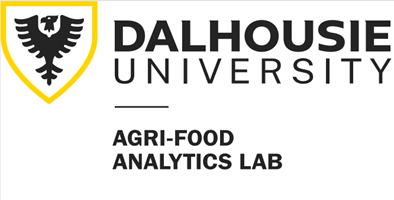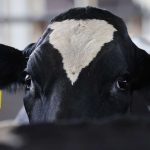
The Agri-Food Analytics Lab at Dalhousie University has contributed to a landmark study that exposes the vast scale of milk wastage within Canada’s dairy industry. Authored by Thomas Elliot (Aalborg University), Benjamin Goldstein (University of Michigan), and Sylvain Charlebois (Dalhousie University), the study estimates that between 6.8 billion and 10 billion liters of milk—valued at up to $14.9 billion CAD—have been discarded on Canadian dairy farms since 2012. This milk waste is a consequence of systemic inefficiencies in Canada’s supply management system.
The study, published in Ecological Economics, one of the most prestigious interdisciplinary environmental economics journals in the world, used a material flow analysis to assess the environmental, economic, and nutritional costs of the wasted milk. It found that, at the upper estimate, up to 10 billion liters of milk were discarded, contributing to approximately 8.4 million tonnes of CO2-equivalent emissions—comparable to the annual emissions of 350,000 passenger vehicles.
In addition to the environmental toll, the study highlights that the discarded milk could have supplied the annual dairy intake for 11% of the Canadian population. The study calls for reforms to address overproduction in the dairy sector, including increasing transparency, revising milk quotas, and reducing incentives for wasteful production.
Key Findings:
- Between 6.8 billion and 10 billion liters of milk discarded since 2012, representing approximately 7 % of milk produced on dairy farms.
- Environmental impact equivalent to 8.4 million tonnes of CO2-equivalent emissions and significant land and water resource waste.
- Nutritionally, the wasted milk could have fed over 4.2 million Canadians annually.
Recommendations to Reduce Milk Waste:
The authors propose several actions to mitigate the issue of milk waste in Canada’s dairy sector:
- Increase Transparency in Milk Production: Mandatory reporting on surplus milk production and waste would help the industry identify inefficiencies and work toward reducing waste.
- Revise Dairy Quotas: Adjusting quotas to better align with market demand and consumer preferences, particularly with the rise of plant-based alternatives, can prevent overproduction.
- Penalties for Overproduction: Reforming the system to penalize overproduction rather than underproduction could help reduce waste and encourage better management of milk supply.
Benjamin Goldstein, co-author from the University of Michigan, emphasized the importance of addressing environmental sustainability: “The environmental cost of surplus milk is significant. By understanding the scale of the issue, we can start making the necessary changes to improve both environmental and economic outcomes.”
Sylvain Charlebois, co-author from Dalhousie University, added: “This study shows that milk wastage is not just a problem of inefficiency; it’s a critical sustainability issue. With proper reforms, the Canadian dairy industry can make a meaningful impact on reducing waste and aligning with broader food system sustainability goals.”
The full study, is now available online in Ecological Economics, one of the leading journals in environmental economics (https://www.sciencedirect.com/science/article/pii/S0921800924003100?dgcid=coauthor).
You can now read the most important #news on #eDairyNews #Whatsapp channels!!!
🇺🇸 eDairy News INGLÊS: https://whatsapp.com/channel/0029VaKsjzGDTkJyIN6hcP1K




















